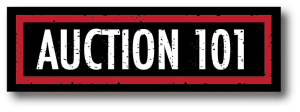AUCTION MANAGEMENT:
90% of the auction is completed before the first bid is called. Thus auction planning is extremely critical to the auction’s success. The auction manager is selected with experience to the auction type, and oversees all set-up, site locations, catering, and closings, bid calling, auction staff & registration.
Behind the Auction, It’s Not Just a Lot of Fast Talk! There’s A Whole Lot More…..
Inventory:
Your merchandise will be inventoried for appraisal, lotting, advertising, cataloging, photography, and recordkeeping. If your items are removed from your premises for sale, you will be provided with a detailed inventory of your items for your records.
Advertising:
Advertising campaign is setup and handled for you. Depending on the type of auction and advertising budget, this may include flyers, postcards, catalogs, direct mailings, newspaper ads, trade publications, emails, and online postings. Tell us your limits you have on advertising and we will handle the rest!
Property Make Ready:
Your merchandise will bring more money when it is in the best cleaned or like new condition. We take care of the cleaning and minor repairs for you. Property make ready is an important part of the sale because it increases value and demand for the property by improving appearance and operating condition.
Site Selection:
Proper Auction site selection is the key to provide accessibility and comfort to increase number of buyers, and to ensure maximum length of buying time. It also allows the auctioneer to manage and control the sale and provide for proper security.
Site Preparation:
Another important part of the auction is the appearance and setup of the site. A good auction site needs plenty of parking, plenty of seating (if applicable), a neat and orderly appearance for best display of all merchandise, as well as, controlled access and exits for security.
Lotting:
All merchandise to be sold is lotted (listed and numbered)for recordkeeping. Also smaller items can be grouped to speed up the process. This will help keep the auction and excitement going, and keep the interest of the buyers.
Registration:
Registration of buyers and issuance of buyer numbers is the system used to call and record purchases. It allows documentation of financial requirements such as letters of credit, cash terms or prior approval. Also it provides the means for meeting sales restrictions such as dealers only, admission by fee only, possession of required license or registration and to verify sales tax exemptions.
Clerking:
An auction clerk is responsible for recording the item sold, the purchaser (by buyer number), the amount bid. This information is passed to the cashier for totaling buyers purchases for collection.
Cashiering:
The cashier for the auction totals the purchases of each buyer, calculates sales tax as applicable, collects monies owed, issues receipts for purchases, verifies financial arrangements, completes auction settlement sheet. We collect applicable sales taxes and pay taxes as collected to state agencies.
Bid Calling:
This is the part of the auction everyone recognizes. Here is where the excitement is built and the bids go up. The auctioneer is normally saying two numbers – the amount he currently has bid, and the amount he is asking for the next bid. The rest are just filler words. Listen for numbers and ignore the rambling (filler words)
Ring Worker:
Ringworker(s) are provided to assist with taking bids. This allows better coverage to help insure that all bidders can be seen and that bids are not going unnoticed. Ring workers are also encouraging others to up their bids during the bid calling.
Property Check Out:
Control of property is maintained until purchases are paid for. In order for a purchaser to obtain merchandise on which they were the successful bidder, they must first pay for the merchandise and present a receipt.
Security:
Security must be maintained before, during and after the sale. Controls are put into place to insure that merchandise is safeguarded until the completion of the auction and collection of funds are complete. Part of this includes check-out service during and after the sale. We will work with the event planners to determine what level of security is needed and afforded.
Accounting:
You are supplied a full accounting of the receipts, sales taxes paid, costs and commission, along with your proceeds from the auction. It is our goal to settle up the proceeds within 48 hours of the close of the sale, but each auction is different.
Escrow Account:
All monies are maintained in an escrow account until full accounting and final settlement has been completed.

